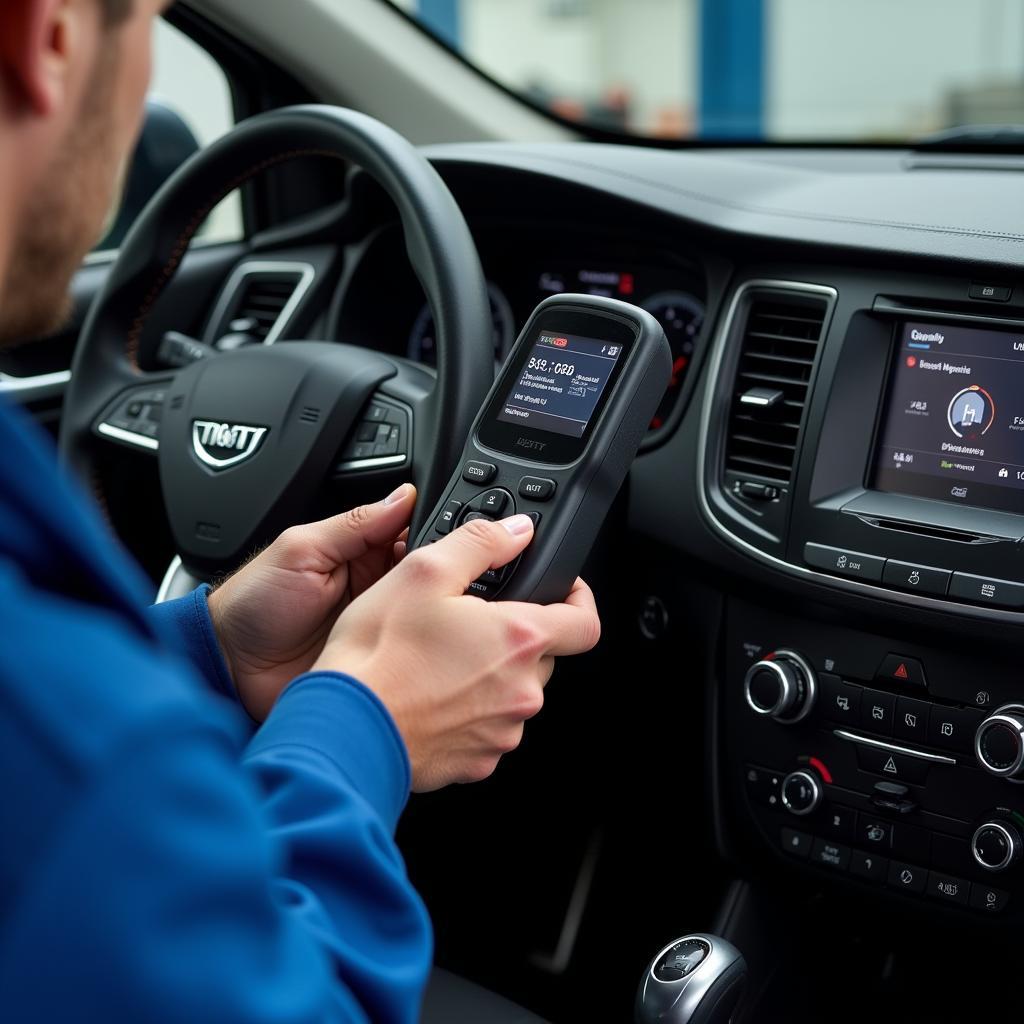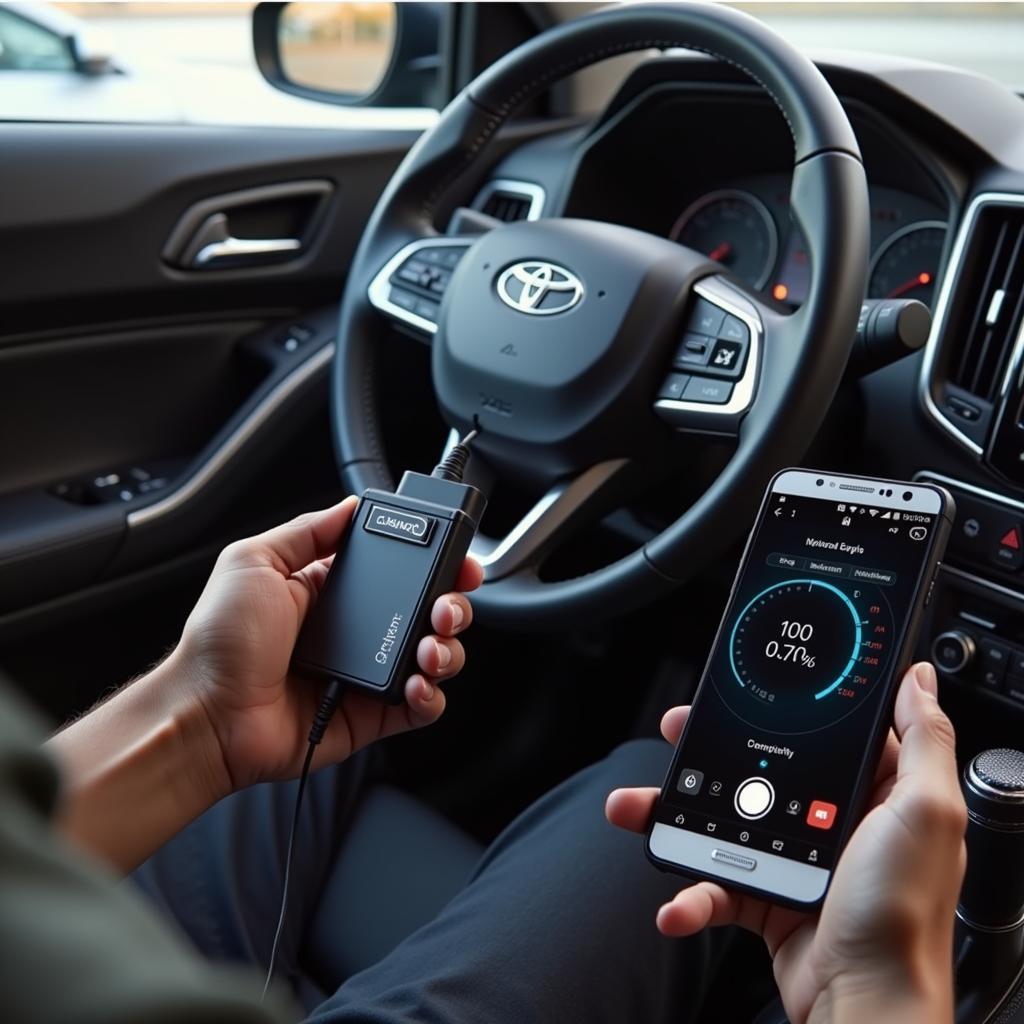Modern vehicles are complex machines, packed with sophisticated electronics and computer systems. When something goes wrong, pinpointing the issue can feel like searching for a needle in a haystack. That’s where car diagnostics come in. A car diagnostic scan acts like an x-ray for your vehicle, revealing hidden problems and helping you understand the health of your car.
What is a Diagnostic on Car?
A car diagnostic is an electronic assessment of your vehicle’s computer systems. It uses a specialized tool, called a car diagnostic scanner or code reader, to communicate with your car’s onboard computer and retrieve valuable data. This data includes Diagnostic Trouble Codes (DTCs), which are standardized codes that indicate specific areas where a malfunction might be occurring.
 Car Diagnostic Scan in Progress
Car Diagnostic Scan in Progress
How Does a Car Diagnostic Work?
Most vehicles manufactured after 1996 are equipped with an OBD-II (On-Board Diagnostics, generation two) port. This port, usually located beneath the steering wheel, acts as the gateway for the diagnostic scanner.
Here’s a simplified breakdown of how it works:
- Connection: The diagnostic scanner connects to your car’s OBD-II port.
- Communication: The scanner sends requests for information to your vehicle’s computer.
- Data Retrieval: The car’s computer responds by transmitting data, including DTCs, sensor readings, and other operational parameters.
- Analysis: The scanner interprets this data and displays it in a user-friendly format, often on a screen.
Why is a Car Diagnostic Important?
Car diagnostics play a crucial role in modern automotive repair and maintenance for several reasons:
- Early Problem Detection: A car diagnostic can detect problems in their early stages, even before you notice any symptoms.
- Accurate Diagnosis: It replaces guesswork with precision, giving mechanics a clear understanding of the issue.
- Cost Savings: By accurately identifying problems, you can avoid unnecessary repairs and replacements.
- Increased Vehicle Lifespan: Addressing issues promptly helps prevent further damage and extends the life of your vehicle.
What Does a Car Diagnostic Tell You?
A car diagnostic provides a wealth of information about your car’s health and performance, such as:
- Engine Performance: It can reveal issues with fuel delivery, ignition timing, emissions, and more.
- Transmission Status: It can identify problems with gear shifting, clutch operation, and other transmission components.
- Brake System: It can detect issues with ABS, traction control, and other brake-related systems.
- Airbag System: It can flag problems with airbag sensors, deployment modules, and wiring.
- Emissions System: It can identify issues impacting your car’s emissions levels.
What are the Different Types of Car Diagnostic Scanners?
There are several types of car diagnostic scanners available, ranging from basic code readers to professional-grade tools.
- Basic Code Readers: These affordable scanners retrieve and display DTCs, providing a starting point for diagnosing problems.
- OBD-II Scanners: These scanners offer more advanced features, including live data streaming, freeze frame data, and the ability to clear codes.
- Professional Diagnostic Scanners: Used by mechanics and dealerships, these scanners provide comprehensive diagnostic capabilities, including module coding and programming.
Can I Do a Car Diagnostic Myself?
Yes, basic car diagnostics can be performed at home using affordable OBD-II scanners. These scanners are widely available online and at auto parts stores. However, it’s important to remember that interpreting diagnostic data accurately requires some automotive knowledge.
 Performing a DIY Car Diagnostic at Home
Performing a DIY Car Diagnostic at Home
When Should I Get a Car Diagnostic?
It’s a good practice to get a car diagnostic scan:
- When the check engine light comes on.
- Before buying a used car.
- As part of regular vehicle maintenance.
- If you notice any unusual performance issues with your car.
Conclusion
Car diagnostics are an essential part of modern vehicle ownership. By providing a window into your car’s internal systems, diagnostic scans help ensure your car runs smoothly, safely, and efficiently. Whether you’re a DIY enthusiast or prefer to leave it to the professionals, understanding car diagnostics empowers you to make informed decisions about your vehicle’s maintenance and repairs.
FAQ
1. What does a flashing check engine light mean?
A flashing check engine light usually indicates a serious engine problem that requires immediate attention.
2. Can I drive my car with the check engine light on?
While it might be possible to drive for a short distance, it’s best to get the issue diagnosed as soon as possible to prevent further damage.
3. How much does a car diagnostic cost?
The cost of a car diagnostic can range from free at some auto parts stores to over $100 at dealerships.
4. Will clearing the codes fix the problem?
Clearing the codes will erase the DTCs from the car’s computer memory, but it won’t fix the underlying problem.
5. Can a car diagnostic detect all problems?
While car diagnostics are very effective, they may not detect every issue. Some mechanical problems may not trigger any codes or symptoms until they become more severe.
Need Assistance?
Have more questions about car diagnostics or need help with your vehicle? Contact our expert team 24/7 via WhatsApp: +1(641)206-8880, or Email: [email protected]. We’re here to provide you with the best support and guidance.

Leave a Reply